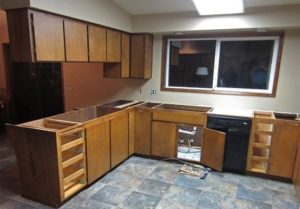 Whether you are a handy home owner looking to “buy up” at a discount, an investor looking for a flip or rental, or a first time home buyer looking for an affordable house you can make your own, a house that needs some repairs can present you with a good opportunity to create equity.
Whether you are a handy home owner looking to “buy up” at a discount, an investor looking for a flip or rental, or a first time home buyer looking for an affordable house you can make your own, a house that needs some repairs can present you with a good opportunity to create equity.
It sounds pretty simple, find a house that needs some help, buy it and fix it up. However, if you aren’t careful it can be quite easy to lose money on a fixer upper. Here are some things you should consider when shopping for a fixer upper.
Get an inspection: It is one thing to be handy with a hammer and saw but quite another to be able to properly inspect a home. Many problems in a house may be obvious: plumbing leaks, failing windows, and a leaky roof for example but it is the ones that aren’t so obvious that can be the most costly to fix. Mold, termites in the walls, water not being properly directed around the foundation and siding that no one knows how to fix or replace (we’ve had this happen) are not always so obvious. We always recommend a professional inspection, even for experienced buyers.
Get bids from a licensed contractor for all repairs: Unless you have been buying and fixing homes for a long time, the best way to know how much a repair will cost is to ask a contractor. Then add ten percent. This will give you a worst case scenario of how much it will cost to fix your home. If you can’t afford to pay someone to complete all the repairs (even if you are planning on doing all the repairs yourself) then it might be a good idea to move on to the next fixer upper. Think of it as an insurance policy. You never know when a timber might fall on your head or a spider might bite you while crawling under the house and if you can’t complete the house you could end up in a really bad place financially.
Calculate the time to completion and be realistic about your ability:

The goal on any fixer upper is to keep cash expenditures to a minimum. For most, the easiest way to do that is to do the repairs yourself. The trick is to know your limitations and not over estimate your ability. Time is of the essence whether you are trying to get the house on the market, get it rented or just ready to move in. Be sure to carefully consider whether or not you have the time to get the repairs done yourself because often there is a surprise hidden behind those walls that can set back your timeline.
Determine if you are creating value and/or equity: It’s great to make a house attractive with stainless steel appliances, granite counter tops, and tile bath surrounds but if you aren’t creating something that people will want to rent or buy at a price that allows you to make money then you better be planning on living there for a long time. Your real estate agent and/or property manager are great resources to help you determine how much value your improvements will add and how they will affect rentability.
Buying a house that needs some work is a great opportunity to make some money whether you are an investor or not. Just be sure to take your time and do your homework because it can also be an easy way to lose a lot of money.


